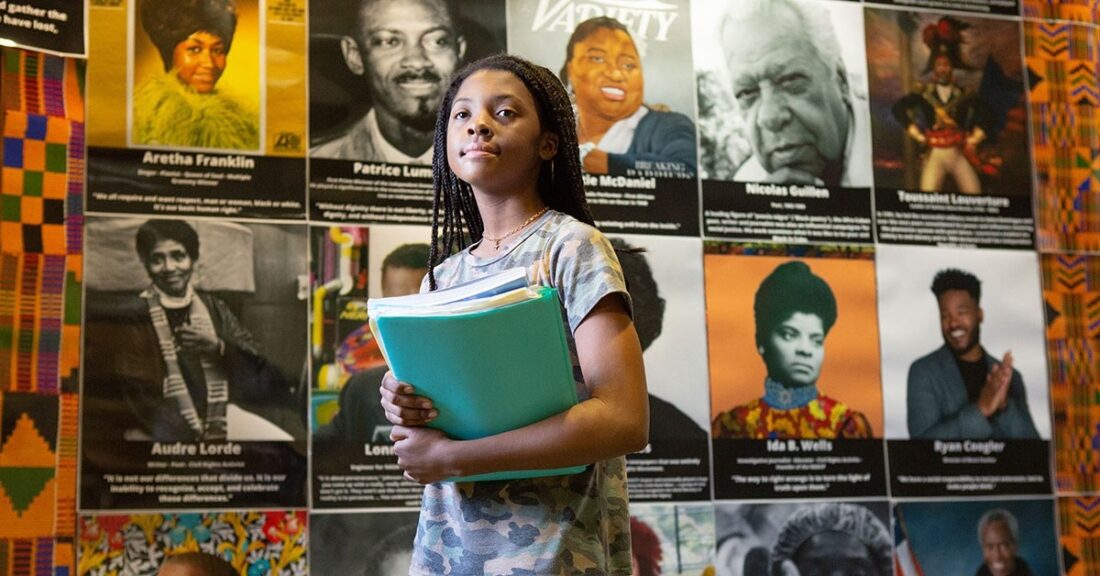A Wealth of Research and Data During National Foster Care Month

Photo by Allison Shelley for EDUimage
In 2020, an estimated 407,493 children and youth were in foster care – a temporary living situation for children whose parents cannot take care of them and whose need for care has come to the attention of child welfare agency staff. While in foster care, children may live with relatives, with foster families or in group facilities.
During National Foster Care Month, this roundup provides a range of research, tools and data the Annie E. Casey Foundation has supported to improve understanding about foster care and the child welfare system.
Trends in Group Placements
Despite longstanding criticisms and calls for less restrictive placement settings, group care ― also called congregate care ― is often used to meet the complex behavioral and mental health needs of children and youth who cannot live at home and serves as an alternative to short stays in treatment facilities. Using Congregate Care captures data about these placements from 15 states over an eight-year period. The report, by the Center for State Child Welfare Data, found that about 20% of young people entering the child welfare system will experience at least one group placement, and approximately 75% of these youth will spend their very first night in a group setting. A separate study by Think of Us captured perspectives, attitudes and experiences of young people who were recently placed in congregate care and found harmful effects from these settings, including missing out on normal activities, feeling a lack of love and becoming emotionally shut down or detached.
Shifts in How Youth Describe Racial and Ethnic Identity
A new study considers shifts in how young people in the child welfare system describe their racial and ethnic identity and the implications of those shifts for policymakers, practitioners and researchers. Conducted by Child Trends, the report makes the case that capturing young people’s racial and ethnic identity is central to accurately interpreting data about young people and to making informed decisions about programs tailored to their needs.
Survey: Priorities for Child Welfare Research
A 2020 survey from the Urban Institute highlights gaps in child welfare research, capturing responses from 300 people involved with child welfare systems across the country, including agency staff, researchers and system constituents such as birth families, foster parents and young adults formerly in foster care. Respondents see the greatest need for research that informs investments in strengthening families before child abuse and neglect can occur.
How COVID-19 Affected Young Parents with Experience in Foster Care
A Casey Foundation webinar, “Five Ways the COVID-19 Pandemic Affected Young Parents with Foster Care Experience,” shares findings from a study involving 26 young parents with experience in foster care. It includes quotes and photos from the parents as well as a presentation by researchers from the University of Maryland and Montclair State University.
Evidence Designation for “Connect” Parenting Skills Program
The California Evidence-Based Clearinghouse for Child Welfare has designated Connect, a 10-week parenting skills and support program,“Well Supported by Research Evidence” — its highest rating available. The program promotes social, emotional and behavioral adjustment and attachment security for youth between the ages of 8 and 18.
Webinar: Funding Strategies to Support Families
This webinar explores funding streams and strategies that child welfare leaders can leverage to support families before they cross paths with the child welfare system. The session, “Funding Strategies to Keep Families Supported, Connected and Safe,” highlights how leaders can collaborate with community organizations and across government systems.
A Tool to Assess the Needs of Teens in Foster Care
Read about the Casey Life Skills assessment, produced by Casey Family Programs, which can be used to identify which sources of support and life skills teens in foster care need. The assessment tool is designed for youth ages 14 to 21 and can aid caseworkers in identifying skill gaps early. In addition, the tool aims to ensure that individual learning plans remain relevant as young people grow — and promotes understanding of the changing strengths, struggles and goals of young people.
Using Advanced Data Analytics to Work for Children and Families
The rapid expansion in advanced analytical tools raises questions about how they can be used for — not against — young people. This brief explores the controversies, ethical challenges and opportunities that these tools create for youth- and family-serving agencies. It also presents four principles for identifying effective and equitable advanced analytics tools and provides real-world examples of how jurisdictions are using these tools.
Data on Adoptions from Foster Care
In 2020, one in four (26%) children who left foster care in the United States was adopted by a family. Learn more about the latest statistics on adoption from foster care from the KIDS COUNT® Data Center.
Foster Care Explained
Learn more about foster care, including what it is, how it works, relevant data and information about how to improve the nation’s foster care system to support better outcomes for children and young people. In addition, find our latest wrap up of child welfare and foster care statistics.
Extended Foster Care Explained
For kids in foster care, independence without adult guidance is particularly challenging, coming at a time when they are graduating high school and preparing to navigate higher education or enter the working world. Recognizing this, many states offer extended foster care — an approach that allows youth to remain in or re-enter care beyond their 18th birthday. This change gives young people more time to successfully navigate the critical transition to adulthood while also affording the child welfare system more time to secure a loving and permanent support network for each youth in care.






